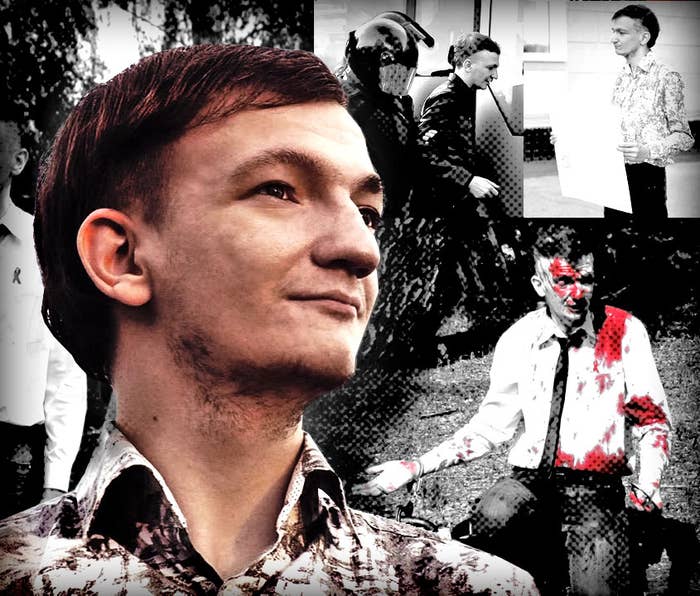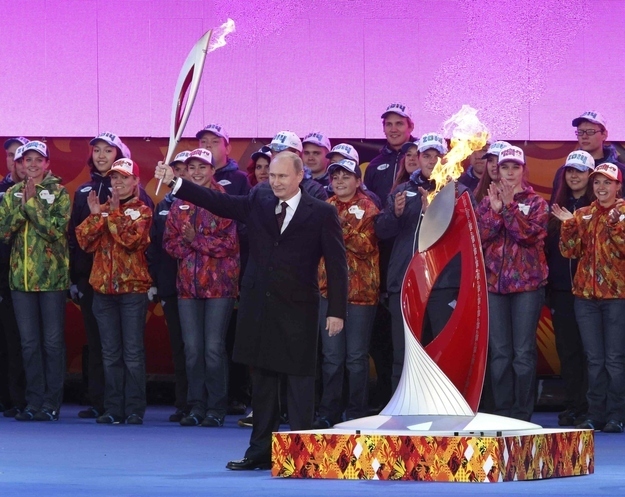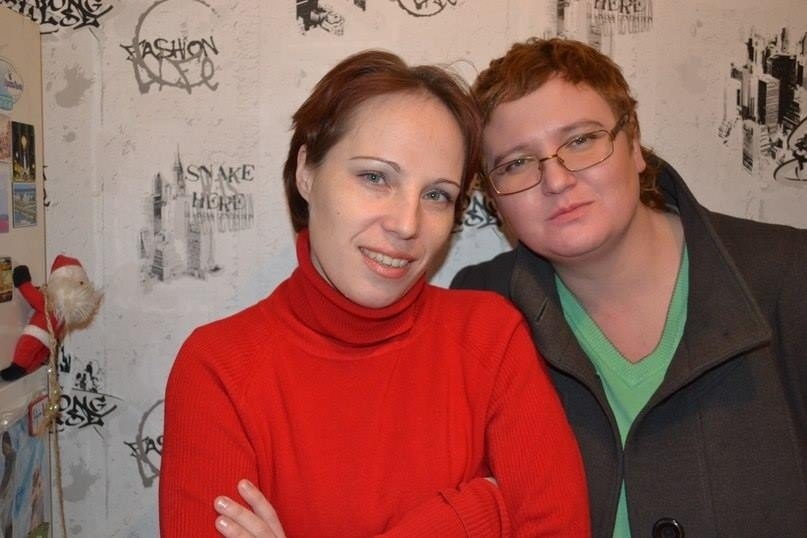
TOLYATTI, Russia — The last two years have been brutal for Konstantin Golava, a 22-year-old environmental activist and the only publicly out gay person in this gritty industrial city known for car factories, chemical plants, and nothing else.
In early 2012, as soon as Golava started disseminating news items related to LGBT issues through his social media accounts, rumors about his sexual orientation began to spread. Since then, he's been beaten up by unidentified thugs, dismissed from his job at a community center working with teenagers, and vilified by national and local media as having desecrated the memory of Soviet victims of WWII by deliberately placing condoms near the city's eternal flame.
One evening in November 2012, while Golava was attending a conference in another city, he agreed to meet on a street corner with a young man who had contacted him. When Golava arrived, several men grabbed him, pushed him into a car with tinted windows, and drove him to a dark, quiet courtyard. They punched him, grabbed his phone, found his mother's number, called, and informed her that her son was a "pedophile" and a "pervert." Then they asked her if they should kill him.
"They threw me out of the car, made me get down on my knees, and pointed the gun at my head," Golava recalled over a recent cup of coffee at a brightly lit café in downtown Tolyatti, a city still crisscrossed by multiple streets named after Vladimir Lenin. "They said, 'A disgusting pig like you, it's not even worth killing you.' And they got in the car and took off." Although he filed a complaint, the police refused to take up the case.
The Russian government's decision last June to ban "propaganda" of nontraditional sexual relationships to minors startled the world and sparked an international uproar, especially as it came in the run-up to February's Winter Olympics in Sochi. But for members of the LGBT community living in Tolyatti and elsewhere in "the provinces" — which in Russia means anywhere that isn't Moscow or St. Petersburg — the federal move was almost anticlimactic.
In the years leading up to the federal law, at least 10 regional governments passed similar anti-LGBT propaganda laws, starting with the regions of Ryazan, Arkhangelsk, and Kostroma. St. Petersburg, seen as Russia's cultural capital, began debating its own law in late 2011 and passed it in March 2012, followed by the Samara region and several others.
Tolyatti is in the Samara region, 500 miles southeast of Moscow, and named after Palmiro Togliatti, a longtime leader of the Italian Communist Party. Life in Tolyatti is stifling and repressive, said Vyacheslav, another gay man who, like Golava, grew up here. If people suspect you're gay, he said, it can be dangerous.
"It's like a small village," he said. "People will point their fingers, call you pederast, they could set your apartment on fire out of hate. Here it's better to be quiet and a bit underground."
Vyacheslav, 30, is wiry and energetic, a former firefighter who is currently unemployed. He wasn't surprised when the Russian government finally passed the federal anti-propaganda law in June. "Once the law passed in St. Petersburg, it was evident," he said. "I figured it would end up being all over Russia. It felt like the country was closing up."
Like many young adults here, Vyacheslav has lived in the same small apartment with his parents most of his life; comings and goings are observed by longtime neighbors as well as family members. Because he would often return home late after being at a gay club or gathering, his parents worried that his nocturnal schedule meant he was dealing drugs. They once surreptitiously checked his phone messages, discovered a love note from a man, and confronted him. Vyacheslav dismissed it as a joke, but since then, he has known that they knew.
Even so, they regularly berate him for his lack of interest in getting married. "It torments them," he said. "And then they constantly torment me, 'Where's the wife and children?'" He fantasizes about making an announcement at a large family gathering, in front of his parents and his many aunts, uncles and cousins. "I would just like to say it to all of them, but I'm afraid," he said. "Because people don't know anything about this issue, and the information they have is bad."
The imposition of anti-propaganda legislation, first in the regions and then nationally, clearly exacerbates the problem of "bad information" by hampering efforts to promote positive LGBT-related images and attitudes. In early December, the new federal law was cited in fining Russian LGBT activists Nikolai Alekseyev and Yaroslav Yevtushenko 4,000 rubles (about $120) each for holding a banner reading "Gay propaganda doesn't exist. People don't become gay, people are born gay" near a library in the far northern city of Arkhangelsk. Weeks later, a court in Kazan found another activist guilty of propaganda for participating in a demonstration last June.
Beyond the legal minefield, however, the anti-gay campaign appears to have provided sanction for unfettered expressions of anger and hatred toward the LGBT community, without fear of consequences. There are frequent reports from around the country about people being fired for their sexual orientation, being beaten up by anti-gay gangs, or otherwise suffering mistreatment and discrimination.
"I'm afraid in Tolyatti — every fifth person knows my face," said Golava, who hopes to move to St. Petersburg soon. "Here, if you do something, you become a star. But I don't need to be a star, I just want to live within my rights."
Golava, a tall, slender man, smiled nervously when talking about the recent events that had made him into the kind of star he doesn't need to be. Before and after the physical assault last fall, he experienced increased bullying and harassment at work, he said. In December, his supervisor called him in and requested him to remove all references to LGBT issues from his social media accounts.
"She closed the door, and I understood what the conversation was about," he recalled. "She started with that phrase all homophobes use, 'I am of course a very tolerant person myself, but...' She said, 'Of course, we like you, but we will have problems because of the laws.'"
Last January, when the federal propaganda law came up for discussion in the parliament, Golava attended a local protest and for the first time publicly declared his sexual orientation to journalists and others who were there. After that, his problems at work intensified, and he was let go in early May.
Two weeks later, his participation at an HIV-prevention event led to the explosive charge that he had defiled the memory of those who perished in the war. The event was organized by Project April, a group that dispenses HIV information; it was held near an eternal flame honoring the war dead in Tolyatti's central plaza, a common site for all sorts of political and nonpolitical events and gatherings. The activists placed more than a dozen candles in red jars on the ground, in the form of a big ribbon. Next to that, they spread out a large piece of red fabric and laid out blue brochures with information about HIV/AIDS and a yellow bowl with condoms meant for distribution to bystanders.
Several days after the event, Komsomolskaya Pravda, a leading Moscow tabloid, published an article headlined: "In Tolyatti, LGBT Activists Laid Condoms at the Eternal Flame." Taking umbrage at the purported disrespect shown by the participants, the journalist wrote that "the tongue can't even twist itself to call them 'citizens.'" The article, which specifically named and ridiculed Golava, triggered an uproar, fanned by further coverage in the news and discussion on social media.
In an effort to quell the furor, Golava and other activists called a news conference to explain their actions. At the event, several men rushed at Golava, handcuffed him to a 70-pound weight, and dumped a bucket of red paint over his head; he still has damage to the vision in one eye from chemicals in the paint, he said. No one has been punished for the assault, but local officials have fined Golava 10,000 rubles (about $300) for having held an unauthorized gathering. His appeal of the fine has been rejected; he is now in the process of appealing to the European Court of Human Rights.

Golava has received moral and legal support from gays and lesbians in nearby Samara, a historic Volga River port and the regional capital that counts more than 1 million residents. A key ally has been Mikhail Tumasov, a longtime Samara resident who two years ago organized an advocacy group to push back against the anti-gay momentum.
Tumasov, 38, moved to Samara from Astrakhan, about 500 miles farther south, when he was in his mid-twenties. Until a couple of years ago, he lived quietly with his partner, socialized with friends, and worked as a sales and distribution manager for local media companies. He never publicly declared his sexual orientation. In fact, Samara had already gained a reputation as a bastion of hostility to LGBT people. In 2011, the magazine Spletnik, which translates as "The Gossip," citing such incidents as a recent effort by a local right-wing party to strip LGBT people of work rights, declared that "the Samara region is among the most homophobic in the country."
By late 2011, the ripple of anti-propaganda legislation spreading across Russia had alarmed Tumasov. "I was afraid for my family, because this was a threat to my partner and me being able to be together," he said. He decided he needed to speak out, and sought support from other Samara gays and lesbians through VKontakte, a Russian social network. They called their organization Avers, which translates as the "obverse" or "heads" side of a coin. The group has about 600 members through its online network, although Tusamov said that only a few dozen participate in Avers activities and only about 10 are "very active" in the group.
After Samara passed its anti-propaganda law in June 2012, Tumasov and several others sued to overturn it; not surprisingly, they lost. Despite the regional and federal laws, Avers has continued to organize events, such as an educational presentation on Dec. 1, World AIDS Day; public gatherings during an annual "week against homophobia," which LGBT groups across the country have organized each spring for several years; and surveys of people in public venues that have revealed an increase in negative attitudes toward LGBT people as the regional and federal government campaigns have progressed.
At the end of December, Avers released an open letter offering profuse thanks to three anti-gay public figures: a politician and two journalists. The letter noted, ironically, how much their actions helped in motivating local LGBT people to organize and find one another as well as in informing the general public about their very existence.
"Two years ago in Samara, there was no civil LGBT-activism," read the letter. "No one living in Samara even knew what gays and lesbians were, and only thanks to the fight for morality…the Samara region has learned that there are in fact gays, and lesbians, and bisexuals, and even transgender people here."

Tumasov is worried that the situation will worsen after the Winter Olympics in Sochi are over, when the international community loses some of its leverage and news organizations turn their attention elsewhere. "They promised the international community that all would be fine for the Olympics," he said, referring to the Russian government. "But after, they'll have no one to answer to." He says he does not favor a boycott of the Olympics, but hopes athletes will speak out and protest Russia's anti-LGBT policies.
Tumasov said he finds the level of knowledge and understanding about LGBT people to be depressingly low, especially in the provinces; so low, in fact, that people will literally believe almost anything they read or hear. "I read an article that said each gay person eats 300 kilos of shit a year," he said. "What is in people's minds that they can have that level of fantasy?" He added, with a laugh: "And yes, that was Russian shit."
The way to counter that ignorance and overcome these stereotypes, he believes, is by "coming out" (many Russians use the English phrase rather than translating it, and they often enunciate it very precisely). But in March of 2012, when Tumasov disclosed his sexual orientation to a recent acquaintance with whom he was developing a platonic friendship, the man beat him up, landing him in the hospital with a concussion and other injuries. He suffered such severe anxiety and distress following the incident that he sought help from a sympathetic psychologist.
"It was terrifying — not just painful physically," he recalled. "I felt like a small dog that's been beaten and wounded and that cringes whenever someone lifts a hand." As for his effort to force change by coming out to new people in his life? He smiled ruefully. "If people want to be my friend, they should know this about me. But I'd say that in this case it didn't work out so well."
Tumasov recently left Samara for Moscow to reunite with his partner, who moved there a year earlier for work. His colleague from Avers, Oksana Berezovskaya, now leads the organization. Berezovskaya, a real estate lawyer, has long been open in her personal life. In 2005, she made a list of dozens of people — family, friends — to whom she felt a need or desire to come out. One by one, she called them and told them she was a lesbian.
"When you're a social person, you want the approval of people close to you," said Berezovskaya, 33. "I wanted to show them, with my example, 'Hey, folks, I'm a lesbian, and I'm a normal person.' I was interested — would they say, 'We won't be friends with you anymore?' But I knew already how my friends felt about me, and everyone accepted it absolutely without a problem."
Of course, she said, many already knew. She suggested that her hair and build — both of which could be deemed Gertrude Stein-ish — allowed perceptive observers to make their own deductions. As with Golava and Tumasov, the emerging repression of the last couple of years galvanized Berezovskaya to go public, although she remains acutely aware of the potential consequences.

"Of course, I'm afraid," Berezovskaya said. "Every time when we have a public event, I'm afraid. You don't know if they'll attack you, or arrest you, or leave you alone. And it's unpleasant to discuss your private life in public. But the government has a different understanding of these things. They force us to come forward and protest."
In the tiny kitchen of a cozy flat on the outskirts of Samara, Berezovskaya and her partner, Vera, 34, served a late-morning breakfast of Russian pancakes with homemade currant jam one recent Sunday. They discussed how they met through their participation in Avers. They spoke of wanting to have a child together, and of waiting to see if the government would revive a much-debated bill restricting or eliminating the parental rights of LGBT people; the bill was quietly withdrawn in October, but its sponsor has said he would seek to reintroduce it.
Berezovskaya said they enjoyed living in the Samara region, where they both grew up. But if the country were to approve such a law, they would have no other option but to seek refuge abroad. "Honestly speaking, we'd prefer to stay here," she said. "Our families and close friends are here, we're comfortable here. But if the politics keeps getting more and more homophobic in an effort to destroy the LGBT community, we'll be forced to leave."
